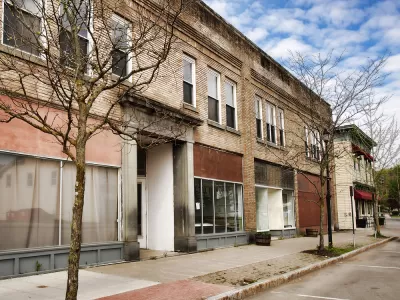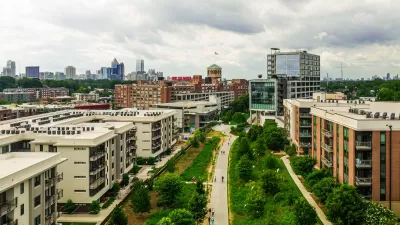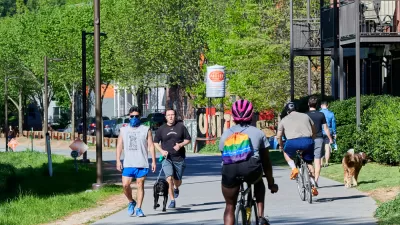One Atlanta neighborhood is experimenting with an ownership model that lets residents buy shares in a community-owned property.

The topics of gentrification and displacement frequently come up when discussing residential neighborhoods, but, as Adina Solomon reports, rising costs and neighborhood change also negatively impact small businesses. One organization in Atlanta is working to address commercial gentrification through a community ownership model.
In Southwest Atlanta's Capitol View, a historically Black neighborhood, residents are concerned that absentee landlords who buy up properties in the neighborhood don't take into account local needs when they renovate buildings and rent space. Consequently, residents don't get the services and retail that they need. The Guild, an "organization focused on building community wealth and closing the racial wealth gap in Atlanta," is testing a community-owned real estate model that aims to put control and profits into local hands and support Black entrepreneurs and legacy businesses. "The organization realized that if it wanted to close the racial wealth gap, it needed to own real estate for the first time." In November 2020, it purchased its first property, a white brick building on Dill Avenue, which it plans to redevelop. "The ground floor will have retail, including a grocery store that the neighborhood requested, and the top two stories will have housing, perhaps 15-17 units. "
"The Guild’s model is a community real estate trust that allows for anyone in the building’s 30310 ZIP code to contribute $10-100 a month. That investment goes into shares of the trust. Resident investors get a return through an annual dividend and the share price, which is tied to property values in this gentrifying neighborhood. The idea is to shift returns from developers to the community." The model operates on the belief that while neighborhood change may be inescapable, when ownership shifts from developers and their investors to the community, projects will benefit local entrepreneurs and long-term residents. "Capitol View, for example, has already gentrified to a certain degree," says Nikishka Iyengar, founder and CEO of The Guild, in the article. "We have to be super mindful about making sure we’re centering legacy residents that are still left."
FULL STORY: An Atlanta Neighborhood Will Finally Own Property as a Community

Planetizen Federal Action Tracker
A weekly monitor of how Trump’s orders and actions are impacting planners and planning in America.

Map: Where Senate Republicans Want to Sell Your Public Lands
For public land advocates, the Senate Republicans’ proposal to sell millions of acres of public land in the West is “the biggest fight of their careers.”

Restaurant Patios Were a Pandemic Win — Why Were They so Hard to Keep?
Social distancing requirements and changes in travel patterns prompted cities to pilot new uses for street and sidewalk space. Then it got complicated.

California Homeless Arrests, Citations Spike After Ruling
An investigation reveals that anti-homeless actions increased up to 500% after Grants Pass v. Johnson — even in cities claiming no policy change.

Albuquerque Route 66 Motels Become Affordable Housing
A $4 million city fund is incentivizing developers to breathe new life into derelict midcentury motels.

DC Area County Eliminates Bus Fares
Montgomery County joins a growing trend of making transit free.
Urban Design for Planners 1: Software Tools
This six-course series explores essential urban design concepts using open source software and equips planners with the tools they need to participate fully in the urban design process.
Planning for Universal Design
Learn the tools for implementing Universal Design in planning regulations.
Heyer Gruel & Associates PA
JM Goldson LLC
Custer County Colorado
City of Camden Redevelopment Agency
City of Astoria
Transportation Research & Education Center (TREC) at Portland State University
Camden Redevelopment Agency
City of Claremont
Municipality of Princeton (NJ)





























